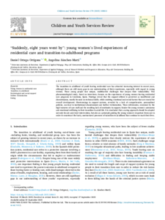The transition to adulthood of youth leaving residential care has attracted increasing interest in recent years, although there are still many gaps in our understanding of their experiences, especially with regard to young women. These young people face unique, multifaceted challenges that deepen their vulnerability. This phenomenological study, based on interviews, focuses on the experiences of young women leaving residential care programs in Catalonia, Spain. Findings reveal that the support offered is perceived as insufficient and discontinuous, mostly focused on technical skills, while omitting emotional and social factors that are crucial for overall development. Shortcomings in support systems, revealed by a lack of comprehensive, personalized policies, can lead to institutional abandonment and further victimization. These deficiencies, worsened by the high turnover of care staff and the resulting lack of continuity in support, hinder the young women’s autonomy and emotional wellbeing in their transition to adult life. It is concluded that a caring approach should be adopted not only for aid and direct intervention, but also as a principle guiding the young women’s departure from care in order to counteract the hasty, unstructured processes of transition to adulthood that continue to mark their lives.

